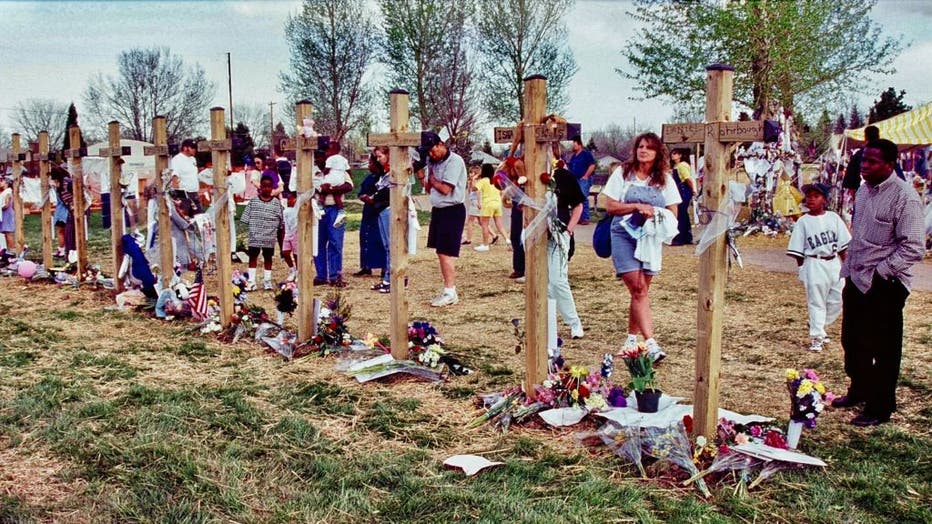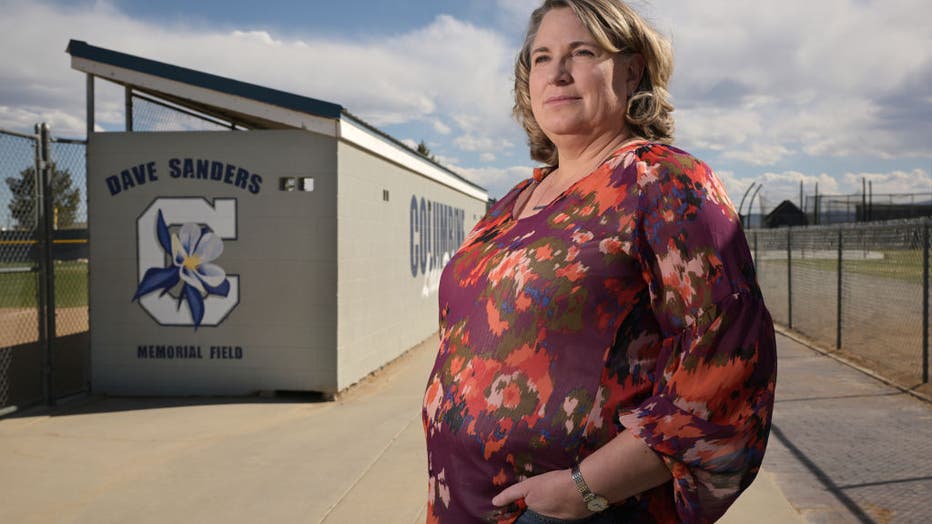25 years after Columbine, survivors still struggle with trauma
Columbine High School principal speaks on mass shooting | NewsNOW from FOX
Former Columbine High School Principal Frank DeAngelis speaks on mass shooting with NewsNOW from FOX's Pilar Arias.
Twenty-five years after the tragic Columbine High School shooting, survivors, now parents themselves, still grapple with the enduring trauma from the attack.
In an interview with the Associated Press, Missy Mendo, a survivor of the shooting, shared that the trauma from that fateful day still lingers vividly.
The enduring trauma has persisted over the years, especially as the United States continues to confront the scourge of mass shootings.
"It felt like nothing changed," she said.
Mass shootings in America: a troubling trend since Columbine
Over the past twenty-five years since the tragic events at Columbine, where two gunmen claimed the lives of twelve students and a teacher in suburban Denver, the lingering traumas of that day have continued to cast a shadow over Mendo and others who experienced it firsthand.
Since Columbine, mass killings have tragically become all too common, occurring with alarming frequency. Data compiled by The Associated Press reveals nearly 600 attacks resulting in the deaths of four or more individuals, excluding the perpetrators, since 2006.
FOX News reported that 1 in 4 public school teachers have experienced a gun-related lockdown in the past year.
At 42, Heather Martin, a former Columbine senior in 1999, has faced enduring trauma.
During college, a fire drill triggered unexpected tears, a visceral response linked to the three-hour fire alarm that echoed the day she and 60 peers sought refuge in a barricaded office during the high school shooting.

Expressions of grief in the Columbine community after the Columbine High School shooting on April 20, 1999. (Photo by Sulfiati Magnuson/Getty Images.)
Her aversion to the classroom where the tragedy unfolded resulted in repeated absences, ultimately leading to academic setbacks. Despite candidly sharing her Columbine experience with her professor, she chose not to write a final paper on school violence, unable to confront the haunting memories head-on.
Martin, a co-founder of The Rebels Project, named after Columbine's mascot, said 25 years has given her time to struggle and figure out how to work out of those struggles.
"I just know myself so well now and know how I respond to things and what might activate me and how I can bounce back and be OK. And most importantly I think I can recognize when I am not OK and when I do need to seek help," she said.
Overcoming Trauma
Kiki Leyba, a novice educator at Columbine during the 1999 shooting, grappled with post-traumatic stress disorder (PTSD) in its aftermath.
Despite a sincere dedication to his profession and a desire to contribute positively to the school community, Leyba found himself besieged by panic attacks.
Seeking solace, he turned to medication, including sleeping pills and Xanax for anxiety relief, alongside the therapeutic suggestion of chamomile tea.
By 2005, after years of not taking care of himself and suffering from lack of sleep, Leyba said he would often check out from family life, sleeping in on the weekends and turning into a "blob on the couch." Finally, his wife Kallie enrolled him in a one-week trauma treatment program, arranging for him to take the time off from work without telling him.
"Thankfully that really gave me a kind of a foothold ... to do the work to climb out of that," said Leyba, who said breathing exercises, journaling, meditation and anti-depressants have helped him.
Michelle DiManna, a math teacher at Columbine during the tragic massacre, continues to teach at the school to this day. In an interview with The Denver Post, she spoke about the enduring resilience and hope within a community forever impacted by one of the deadliest school shootings in American history.

Michelle DiManna poses for a portrait at Dave Sanders Memorial Field of Columbine High School in Littleton, Colorado on Friday, April 12, 2024. DiManna still teaches math at the school 25 years after the shooting.
"We take care of each other," DiManna said. "You don’t really leave your family after trauma — and that is what Columbine is."
US gun law enforcer concerned about desensitization to mass violence
In a separate interview with the Associated Press last month, Steve Dettelbach, the head of the federal Bureau of Alcohol, Tobacco, Firearms and Explosives (ATF), voiced deep concern over the increasing frequency of mass shootings and gun violence in the United States.
He fears that this relentless barrage of tragedies could desensitize Americans to the horrors of such events, leading to apathy rather than action in addressing the underlying issues.
"It seems to me that things that we used to sort of consider memorable, life-altering, shocking events that you might think about and talk about for months or years to come now are happening with seeming frequency that makes it so that we sort of think, "That’s just the one that happened this week,’" he said. "If we come to sort of accept that, that’s a huge hurdle in addressing the problem."
While gun violence remains a divisive and politicized issue in the country, there have been attempts to prevent further mass killings. However, these efforts have largely failed to make a significant impact, resulting in a repetitive and predictable cycle of continued gun violence.
In 2022, President Joe Biden signed a landmark gun violence bill, marking the most significant legislative action on this issue in decades. This bipartisan compromise, previously thought unimaginable, gained momentum following a series of tragic mass shootings that year, notably the devastating Uvalde incident in May 2022, which claimed the lives of 19 students and two teachers.
"God willing, it’s going to save a lot of lives," Biden said at the White House when he signed the bill.
Despite this legislative action, the United States has witnessed hundreds of mass shootings since the bill was signed into law.
The Associated Press contributed to this story. It was reported from Los Angeles.

